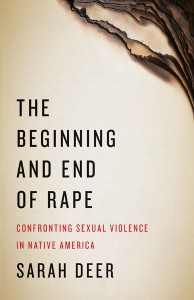Mitchell Hamline professor Sarah Deer took part in a day-long event at the White House on Friday, Nov. 13.
The conference focused on research being done on the lives and well-being of women and girls of color. “Advancing Equity for Women & Girls of Color: A Research Agenda for the Next Decade” was hosted by the White House Council on Women and Girls.
Deer was part of a panel discussion entitled “Vulnerability to Violence.” Deer, a longtime advocate for Native American women and girls who’ve faced sexual violence, has worked to reform federal, state, and tribal laws dealing with rape.
Deer’s new book, “The Beginning and End of Rape,” represents a decade’s worth of work on those fronts.
It’s a collection of essays Deer penned based on the experiences of Native American women with sexual violence.
“I started to hear these horrific stories about how Native women didn’t have anywhere to turn,” Deer explained. “They were hopeless and being treated with such disrespect.”
 A citizen of the Muscogee (Creek) Nation, she co-directs Mitchell Hamline’s Indian Law program and is considered one of the nation’s leading experts on Native American rights.
A citizen of the Muscogee (Creek) Nation, she co-directs Mitchell Hamline’s Indian Law program and is considered one of the nation’s leading experts on Native American rights.
Deer won a MacArthur Foundation “genius grant” in 2014 for her work on behalf of Native American women.
She co-authored a 2007 Amnesty International report on the problem of sexual violence. And Deer’s work on the 2010 Tribal Law and Order Act and the 2013 reauthorization of the Violence Against Women Act was seen as essential in giving tribes more authority over cases of sexual violence.
Deer’s new book casts a light on the persistent problem of sexual assault for Native women.
Federal data estimate 1 in 3 Native American women will be raped in their lifetime, which is two and a half times the likelihood for women in the national population. Deer fears the number is much higher, perhaps 80 to 90 percent in some areas, because many cases go unreported.
As its title suggests, Professor Deer’s book delves into the history and politics of why Native American woman face disproportionate levels of sexual violence.
Deer shows evidence that the scourge of sexual violence began during the colonization of North America and worsened in the following centuries as tribes lost their ability to govern themselves.
“This problem is as old as America, as old as the settlement and pre-America,” Deer said. “If we can think about that as where things started, then follow that journey up until contemporary times, we can end it.”
Deer’s book suggests solutions to end sexual violence against Native women, something she labels “a crime against humanity”.
She proposes tribal leaders and governments be given more freedom to enact strong anti-rape measures instead of having to rely on a confusing mix of federal, state, and tribal jurisdictions to respond to claims of sexual violence.
Deer also wants all women in Native America to have access to advocacy programs to help them deal with the trauma of sexual violence or prevent it altogether.
But she warns there can’t be a one-size-fits-all approach for the nation’s 560 federally recognized tribes and governments.
“What works for one tribe is not going to work for another tribe,” Deer said. “Rape has to be ended by tribal nations.”
Kirkus Reviews called the book “a blunt, trenchant exposé on the history and impact of sexual violence on indigenous tribal nations”.
And the online Native American news site Indian Country Today recommended it for “everyone who cares about women and children”.
Deer spoke about her book with Tom Weber of MPR News on Friday, Nov. 6. Listen to the program on the MPR News website.

